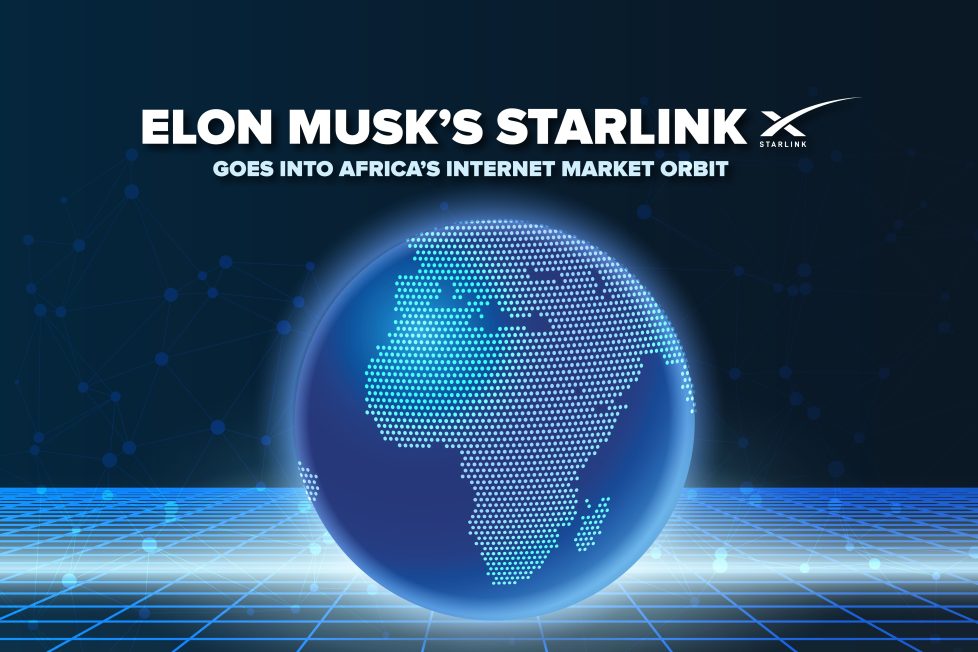Elon Musk’s Starlink Satellite Internet Comes to Africa
Starlink's aggressive push for a slice of Africa's telecoms pie is the latest sign of growing internet capacity and falling data rates across the continent.

Starlink's aggressive push for a slice of Africa's telecoms pie is the latest sign of growing internet capacity and falling data rates across the continent.

By Conrad Onyango, bird, story agency
Elon Musk’s Starlink debut in Africa is sparking a battle for under-served customers in an already competitive internet market.
Nigeria became the first African market to begin deployment and gain access to Starlink’s satellite internet services in late December 2022, even as the company owned by the billionaire businessman continue to map out and prepare for aggressive launches into more African markets.
“On the partnership with SpaceX and StarLink. They have now commenced the deployment of their facilities in Nigeria. Nigeria is the first African country to reach that partnership and also approval for the deployment,” said Nigeria’s Minister of Digital Economy, Isa Pantami, on his official Twitter handle.
As many as 10 new markets, including Kenya, Angola, Morocco, Mauritania, DR Congo, Mozambique and Tanzania, will likely see the service launch in 2023.
Kenya and Angola are likely to be the second and third markets to access Starlink’s internet from space, respectively, with launches planned for the second quarter of the year.
Starlink’s biggest selling points in these markets are higher speeds and low latency in areas with existing coverage, broader coverage areas covering rural areas and the flexibility for customers to move with their internet services.
The company’s website says it is redefining space internet services, which have traditionally struggled to provide high-speed services at affordable prices for regular consumers.
“Starlink is the world’s first and largest satellite constellation using a low Earth orbit to deliver broadband internet capable of supporting streaming, online gaming, video calls and more,” it says.
The satellite internet will be offered to residential, business, on the road, at sea and in-flight customers.
Starlink’s proposition directly competes with Africa’s big telcos like MTN, Airtel and Vodacom, and fibre internet providers.
Young and tech-savvy African consumers are driving demand for high-speed internet with the rise of streaming, online gaming, voice calls over the internet and remote working and learning fueling demand.
This has fueled an increase in infrastructure investment, including the rollout of 5G internet services.
In its latest analysis titled, Global Internet Geography, Telecommunications market research and consulting firm, TeleGeography shows that Africa’s internet bandwidth capacity has outpaced average global growth over the past five years, growing 44% compared with the average global increase of 29%.
Between 2018 and 2022, the average internet by connected users in Africa dropped by 2%, meaning that nearly two-thirds of the continent’s internet supply remains idle. Peak utilisation is pegged at 61%.
This lays the ground for potential price wars that could benefit end-users through affordable data plans, according to TeleGeography.
“Price erosion remains the universal norm. It reflects the introduction of competition into new markets and the response of more expensive carriers to lower prices,” the consulting firm said.
Analysts project that with increased infrastructure – including Starlink – wholesale internet connectivity prices will drop as part of an international trend.
“As new international networks are deployed, operational and construction costs are distributed over more fibre pairs and more active capacity, making each packet less expensive to carry,” according to the analysis.
Starlink is currently selling its satellite dish at US$ 599 with a monthly Internet fee for a residential building pegged at US$ 110, with users able to access speeds of up to 150Mbps.
In Nigeria, where the rollout is ongoing, monthly subscriptions have been set at US$ 43 per month, indicating that each country will have varied monthly access charges.
Data prices across Africa have declined over the last three years, but a steep costs rise has recently seen Nigeria’s top telcos, Airtel and MTN, increase the cost of internet access.
“Y’ello. Apologies for the data price review. Please note that there has been a revamp in prices of some MTN data plans,” announced MTN in a September 2022 Twitter post.
In October, Airtel Nigeria also apologised to a customer on Twitter, confirming that the telco had increased the data plans by around 1 US dollar.
“Apologies for the inconvenience. Please be informed that our bundles have been modified. Kindly note that the N5000 data bundle is now N5500.”
However, the price picture has been markedly different on the other side of the continent.
In December, Kenya’s largest telco, Safaricom, brought down the cost of its monthly voice, data and SMS services packages, reversing a price increase that followed a 5% adjustment of Excise Duty on Airtime and Telephone Services in July 2021.
Safaricom’s cut of 4.7% on its US$ 8 package saw users given data bundles of up to 15GB, markedly undercutting the prices set by its rivals.
“By consolidating our monthly plans, we seek to simplify our product offering while enabling our customers to enjoy a digital lifestyle affordably,” said Safaricom’s CEO, Peter Ndegwa.
The latest data published by Cable.co.uk in its Worldwide mobile data pricing 2022 report ranks Kenya and Nigeria among African countries where the average cost of one gigabyte (1GB) is less than a dollar.
Nigeria ranks 48th worldwide, with an average price of US$ 0.71, while Kenya ranks 61st globally, with an average price of US$ 0.84.
Algeria offers the cheapest prices in Africa, US$ 0.48 and ranks 29th globally, followed by Libya (US$ 0.61 ) and Somalia (US$ 0.63).
This story was republished with the permission of bird, a story agency under Africa No Filter.
